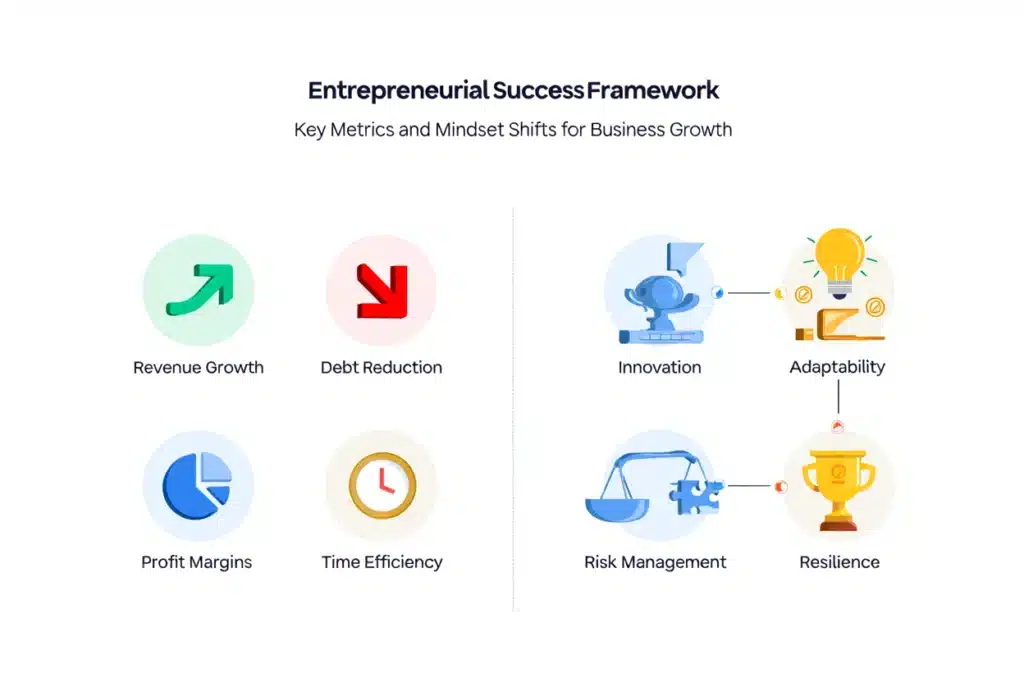Introduction
Entrepreneurship is an exciting yet challenging journey. Every year, thousands of startups are launched, yet nearly 90% fail within their first five years. Understanding why entrepreneurs fail is essential to avoid common pitfalls and achieve lasting success. This article explores seven critical mindset shifts that can transform failures into stepping stones for business growth, backed by real-world examples, actionable advice, and practical strategies.

The right mindset can mean the difference between a failed venture and a thriving enterprise. By the end of this article, you will gain insights into the habits, approaches, and thinking patterns of successful entrepreneurs, preparing you to navigate the entrepreneurial journey with confidence.
1. From Fear of Failure to Embracing Calculated Risk

Fear of failure is one of the most common reasons entrepreneurs never take the leap. Many potential founders hesitate to invest, launch products, or expand operations due to the fear of losing money or reputation.
Why it matters: Avoiding risk often leads to missed opportunities. Successful entrepreneurs like Elon Musk and Sara Blakely embrace calculated risks, evaluating potential outcomes and preparing contingency plans.
Practical Steps:
- Conduct thorough market research to understand potential demand and competition.
- Use a risk matrix to assess likelihood and impact of business decisions.
- Treat small failures as learning experiences rather than setbacks.
Example: Sara Blakely initially invested her savings to create Spanx, facing significant risk without traditional backing. Her willingness to embrace risk led to a billion-dollar enterprise.
2. From Short-Term Thinking to Long-Term Vision
Many entrepreneurs focus on quick wins, resulting in unsustainable business practices. A long-term vision ensures that strategic decisions are aligned with future goals.
Case Study: Amazon began as an online bookstore but focused on a long-term vision to become the global leader in e-commerce, investing in technology, logistics, and customer experience.
Actionable Tips:
- Draft a 5-year roadmap for your business, outlining product development, marketing, and financial goals.
- Prioritize decisions that support scalability and sustainability.
- Avoid shortcuts that sacrifice long-term growth for short-term gains.
3. From Perfectionism to Iterative Progress
Perfectionism delays action. Entrepreneurs often wait until products are “perfect,” missing market opportunities and wasting resources.
Practical Approach:
- Launch a Minimum Viable Product (MVP) to test ideas quickly.
- Collect customer feedback and iterate rapidly.
- Focus on continuous improvement, not flawless initial execution.
Example: Dropbox started as a basic MVP, using customer feedback to refine its product before scaling globally.

4. From Avoiding Feedback to Seeking Mentorship
Ignoring feedback or advice can lead to repeated mistakes. Mentorship provides experience, perspective, and accountability.
Case Study: Richard Branson attributes Virgin Group’s success to mentorship and guidance, which helped him navigate critical business decisions.
Actionable Steps:
- Join entrepreneurial networks or incubators.
- Schedule regular meetings with mentors.
- Implement feedback systematically, turning advice into actionable improvements.
5. From Fixed Mindset to Growth Mindset
Entrepreneurs with a fixed mindset believe abilities are innate and unchangeable, avoiding challenges and fearing failure. A growth mindset views challenges as opportunities to learn and improve.
Implementation Tips:
- Reframe failure as a learning experience.
- Invest in personal development and skill enhancement.
- Cultivate a learning culture within your team.
Example: Satya Nadella transformed Microsoft by embracing a growth mindset, encouraging innovation and learning at all levels.
6. From Overconfidence to Data-Driven Decisions
Overconfidence can blind entrepreneurs to market realities, leading to poor decision-making. Using data to guide decisions minimizes risk and improves outcomes.
Practical Steps:
- Track key performance indicators (KPIs) for financial health and customer engagement.
- Use analytics tools to monitor market trends.
- Base strategic decisions on evidence, not intuition alone.
Table 1 – Example Key Metrics Tracking
| Metric | Target | Current | Notes |
|---|---|---|---|
| Monthly Revenue | $50,000 | $42,000 | Increase marketing efforts |
| Customer Retention | 85% | 78% | Improve loyalty programs |
| Customer Acquisition Cost | <$30 | $35 | Optimize advertising campaigns |
7. From Isolation to Building a Supportive Network
Entrepreneurship can be isolating. Attempting to navigate all challenges alone increases failure risk. A strong network of advisors, peers, and collaborators is crucial.
Actionable Advice:
- Attend industry events and conferences.
- Join peer mastermind groups for accountability.
- Collaborate with strategic partners to leverage complementary strengths.

Conclusion
Failure is part of the entrepreneurial journey, but it does not define your future. By embracing these seven mindset shifts, entrepreneurs can navigate challenges, capitalize on opportunities, and increase their likelihood of long-term success. Implement these strategies today, and explore further insights in [How to Think Like a Millionaire] and Top 5 Online Businesses You Can Start in 2025.

Links Internos
- The Complete Guide to Smart Investing in 2025
- 10 Money Habits That Will Make You Financially Free
- [How to Make Passive Income Using AI Tools]
- [Affiliate Marketing for Beginners: Step-by-Step Guide]
Author Box (E-E-A-T)
Author: The Gold Nine Editorial Team
Bio: The Gold Nine Editorial Team specializes in personal finance, digital entrepreneurship, and investment strategies. We provide actionable insights with authority and trustworthiness.
Experience & Expertise:
- Financial content creation and digital monetization
- In-depth knowledge of online businesses, investing, and passive income
- Proven track record guiding readers to financial freedom
Contact: support@thegoldnine.com
Disclaimer
This article is for informational and educational purposes only. It does not constitute financial advice, investment guidance, or professional recommendation. Always consult a qualified financial advisor or professional before making investment or business decisions.
Other Articles
- The Complete Guide to Smart Investing in 2025
- 10 Money Habits That Will Make You Financially Free
- [How to Make Passive Income Using AI Tools]
- [Affiliate Marketing for Beginners: Step-by-Step Guide]